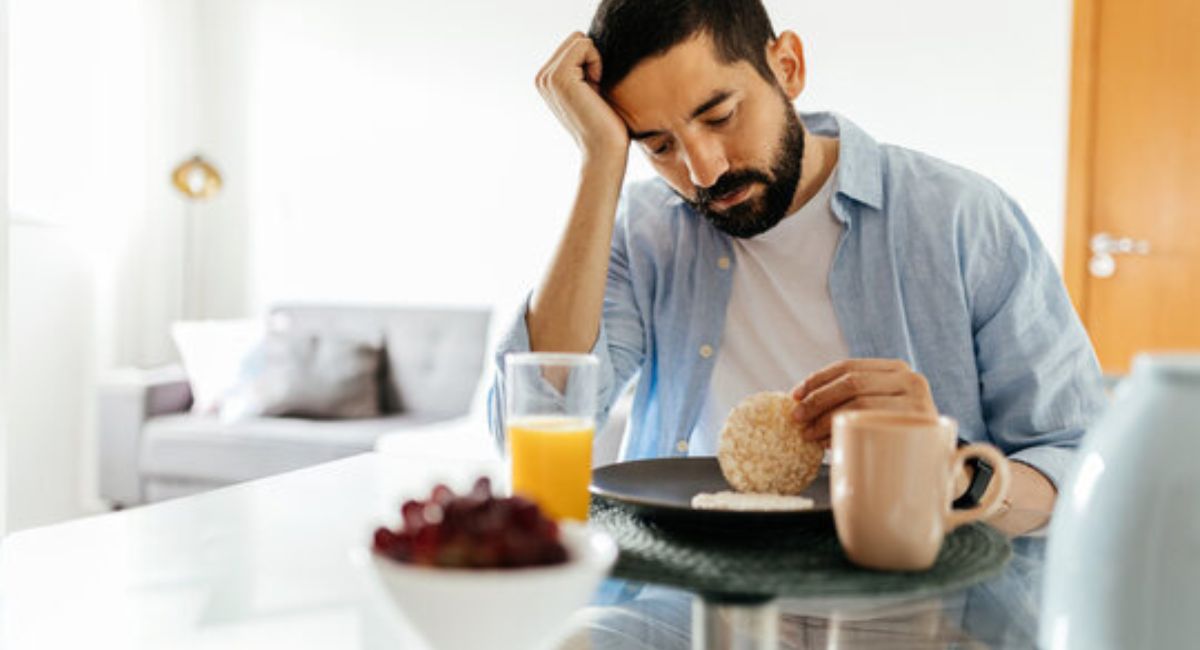I never thought stress could take away my hunger until it happened to me. Meals I once loved didn’t interest me, and even the smell of food felt heavy. If you’re going through the same thing, anxiety and lack of appetite can make every day feel harder and leave you wondering what’s wrong with your body.
In this blog, you’ll learn why anxiety steals your hunger and how to get it back. We’ll explore clear reasons, real-life tips, and gentle ways to heal both your mind and body. By the end, you’ll feel more confident about understanding your symptoms and ready to start improving your appetite and overall well-being.
What Is the Connection Between Anxiety and Lack of Appetite?
When anxiety shows up, your body flips into fight-or-flight response mode. That sharp reaction sends signals that dull your hunger, contributing to stress and hunger suppression. As your cortisol levels spike, the typical hunger cues fade. You might find yourself ignoring meals because your brain prioritizes survival over nutrition, even though you’re not in danger.
Understanding anxiety’s effect on appetite means recognizing how emotional stress reshapes your eating patterns. In Americans today, juggling jobs and family, emotional stress and eating changes often go hand-in-hand. You may feel hungry but unable to eat or lose interest in food altogether. That’s how your body signals it’s overwhelmed—and why hunger slips away.
Common Physical and Emotional Symptoms of Anxiety-Related Appetite Loss

Anxiety often brings gastrointestinal effects of anxiety that can make food unappealing. You might sense nausea, a queasy stomach, or bloating. Your digestive system tightens up, and even the sight or smell of food can feel overwhelming. Meanwhile, your mood dips—irritability or low energy might take over, making meals feel like too much effort.
At the same time, weight loss from anxiety can sneak up on you. Maybe your jeans feel looser or you feel weaker. Emotionally, you might feel distracted or on edge, struggling to focus. That kind of physical decline couples with mental fatigue, showing how closely anxiety and appetite loss dance together—and why paying attention early matters.
How Anxiety and Stress Hormones Suppress Hunger Signals
Imagine your body flooding with cortisol and digestive system changes whenever you’re worried. That messes with your stomach’s rhythm and slows digestion. You produce less saliva, your gut slows, and hunger hormones like serotonin and appetite signals go out of tune. Suddenly eating feels like a chore.
At the same time, stress and hunger suppression becomes a cycle. Your brain downshifts your appetite to manage the overwhelm, but then you don’t eat enough, which raises anxiety more. That downward spiral hurts your mood, energy, and focus. Understanding this cycle lets you start breaking it—step by step.
Health Risks of Prolonged Appetite Loss Due to Anxiety
Go too long without proper nutrition, and your immune system weakens. That means cold, flu, and infection hit you harder. Your body lacks fuel to heal. On top of that, lack of appetite affects your mood and mental resilience. Falling into a rut of fatigue, anxiety, or even depressive moods feels easier when you skip meals that nourish both body and mind.
Worse, over time managing appetite during anxiety becomes harder. You risk malnutrition, vitamin shortfalls, and even clinical eating disorders. Your muscles lose strength, your skin sags, and your focus dwindles. In simple terms, ignoring hunger because of stress can spiral into serious health troubles if it continues.
Underlying Causes and Triggers of Anxiety-Related Eating Changes
Busy work life and deadlines—from coast to coast in the USA—often push your stress levels sky high. That anxiety eats away at your hunger. Past trauma or chronic anxiety disorders also disrupt hunger cues. You might feel stuck in survival mode, where your mind ignores basic needs.
Even some medications can affect your appetite. When you start treatment for anxiety, appetite changes can pop up whether or not the medicine helps your symptoms. That’s where therapy for anxiety-related eating problems or nutritional counseling becomes key. You need support that covers both your mind’s worry and your body’s need to eat.
Practical Tips to Manage Anxiety and Improve Appetite

Start small. Eating soft, mild foods in small amounts—soup, yogurt, toast—can coax your appetite back. Try mindfulness techniques before meals: breathe deeply, notice how food smells, let your body guide you to take the first bite. That quiet moment can reconnect you to hunger cues.
At the same time, use gentle reminders—set alarms or keep healthy snacks within reach. Make meals social if you can. Sharing food with someone you care about can boost both mood and appetite. Rebuilding your eating rhythm one tiny change at a time anchors your body in comfort again.
Evidence-Based Treatments: Therapy, Medication, and Lifestyle Changes
One of the most reliable strategies is cognitive behavioral therapy (CBT). It helps you recognize how anxiety disrupts your eating, then gently rewires thoughts so you feel safer and more relaxed around food. This shift strengthens your hunger signals and brings back balance.
On the medical side, some anxiety medications help without chopping appetite. When they don’t, your doctor may tweak doses or try alternatives. Alongside therapy, simple lifestyle tweaks—getting enough sleep, moderate exercise, keeping social—work like anchors. They support both your mood and your desire to eat.
Natural and Ayurvedic Remedies to Reduce Anxiety and Support Nutrition
You might explore natural remedies for stress and appetite. Herbs like ashwagandha, chamomile, or lavender teas soothe nerves and invite gentle hunger. Traditional Ayurvedic guidance often includes warming soups, light spices, and mindful eating habits that soothe your body’s inner balance.
You can mix these into your care plan—just check with your doctor before adding supplements, especially if you’re on medication. These natural approaches often complement other treatments. They don’t replace therapy or counseling but add a gentle, ancient layer of support to nourish both mind and body.
When to Seek Professional Help for Anxiety and Nutritional Issues
If you can’t eat for days or lose more than a few pounds quickly, that’s a sign to act fast. Likewise, if skipping meals triggers dizziness, fainting, or deeply low moods, talk to a professional. Mental health treatment centers and nutritional counseling services across the USA can guide you back to health.
You don’t have to go looking alone. Many clinics offer both mental health and diet support. If your body feels weak and your mind overwhelmed, reaching out early prevents missing meals from turning into deeper struggles.
Clinics and Support Centers for Anxiety and Nutrition Care Near You

In the U.S., you’ll find clinics that combine mental health services with nutrition help. Major cities often have wellness centers offering therapy, dietary evaluations, and holistic care. Even community health clinics often connect you with licensed dietitians and counselors.
When choosing a clinic, look for one that covers both anxiety and appetite concerns. Ask whether they offer nutritional counseling alongside therapy. That pairing helps your mind calm and your hunger rebuild in harmony.
FAQs About Anxiety and Lack of Appetite
1. Can anxiety cause long-term appetite problems?
Yes. Chronic anxiety can disrupt hunger hormones and digestion over time, leading to lasting appetite changes.
2. Why do I feel nauseous when I try to eat during anxiety?
Because stress hormones slow digestion and tighten stomach muscles, food can feel heavy or trigger nausea.
3. Should I force myself to eat if I’m not hungry from anxiety?
You don’t need to force large meals, but eating small, easy-to-tolerate foods is important for keeping energy stable.
4. Can anxiety make me lose weight quickly?
Yes. Loss of appetite, combined with increased calorie burn from constant stress, can lead to rapid weight loss.
5. Does medication for anxiety affect appetite?
Some medications can increase or decrease appetite. If you notice changes, talk to your doctor.
6. Is loss of appetite always from anxiety?
No. It could also be linked to depression, infections, thyroid issues, digestive disorders, or other medical conditions. Always rule out physical causes.
7. What if I overeat when my anxiety goes down?
That’s common—when the body leaves survival mode, hunger can rebound strongly. Gentle, balanced meals can help regulate this.
Final Thoughts: Reclaiming Calm and Nourishment
Anxiety and lack of appetite often feel like a tug-of-war between your body and mind. But understanding why it happens—and learning how to respond—can help you break the cycle.
Remember: your appetite isn’t “broken.” It’s simply responding to stress signals. By addressing both the anxiety and the eating patterns, you can restore balance. Start small, give yourself compassion, and don’t hesitate to reach for professional support when needed.

